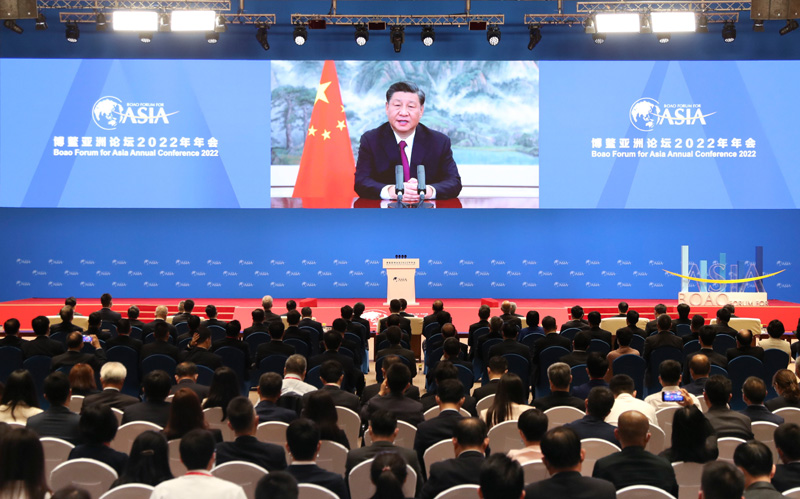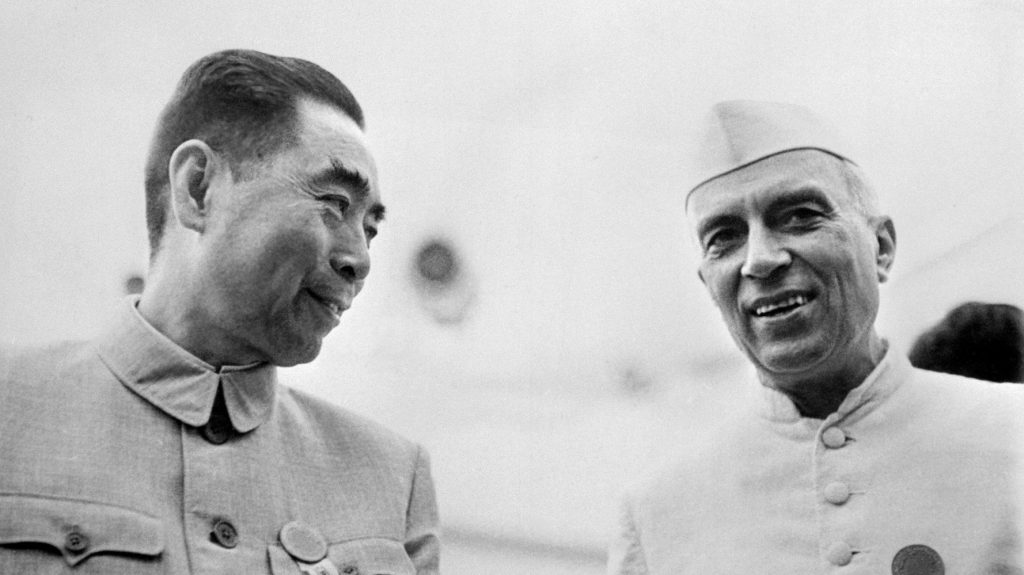
By Sun Weidong, H.E. Ambassador of China to India
The world has yet to emerge from the shadow of the pandemic, and the Ukraine crisis is already wreaking havoc. Various traditional and non-traditional security threats are intertwining. Facing changes of the world, of our times and of history, people are asking, “What security concept the world needs and how countries can achieve common security? ” To answer the questions of our times, President Xi Jinping proposed for the first time the Global Security Initiative (GSI) at this year’s Boao Forum for Asia Annual Conference in April, which offers China’s solution.
Six Commitments

The GSI is underpinned by “six commitments”, that is, to stay committed to the vision of common, comprehensive, cooperative and sustainable security; stay committed to respecting the sovereignty and territorial integrity of all countries; stay committed to abiding by the purposes and principles of the UN Charter; stay committed to taking the legitimate security concerns of all countries seriously; stay committed to peacefully resolving differences and disputes between countries through dialogue and consultation; stay committed to maintaining security in both traditional and non-traditional domains. These six commitments of the GSI include macro thinking of top-level design as well as methods and pathways for addressing practical issues. It seeks to promote the establishment of a balanced, effective and sustainable security architecture, to further eliminate the root causes of international conflicts and achieve durable stability and security in the world.
The first commitment emphasizes that the new vision of common, comprehensive, cooperative and sustainable security serves as a guiding principle for maintaining world peace and tranquillity. Claiming supremacy over others and the strong bullying the weak would cause instability, and that the law of the jungle and power politics would lead to conflict and chaos. We must insist on the new type of security that features dialogue, partnership and win-win instead of confrontation, alliance and a zero-sum approach.
Respecting Sovereignty
The second commitment emphasizes that respecting sovereignty and territorial integrity of all countries is the basic prerequisite for maintaining world peace and tranquility. We should uphold sovereign independence and equality, so as to ensure that all countries enjoy equal rights and opportunities and follow the same rules. The principle of sovereignty is the cornerstone for norms governing international relations in contemporary times.
All countries, big or small, strong or weak, rich or poor, are equal members of the international community. Their internal affairs brook no external interference, their sovereignty and dignity must be respected, and their rights to independently choose their social systems and development paths must be upheld.
True Multilateralism
The third commitment emphasizes that abiding by the purposes and principles of the UN Charter is the fundamental requirement for maintaining world peace and tranquillity. The purposes and principles of the UN Charter embody humanity’s institutional design for achieving collective security and lasting peace. To effectively implement aforementioned purposes and principles, we must act on true multilateralism, firmly reject unilateralism and all forms of fake multilateralism, and oppose all “gang rules” set by a few without UN authorization and at odds with the spirit of the UN Charter.
The fourth commitment emphasizes that taking the legitimate security concerns of all countries seriously is an important principle for maintaining world peace and tranquility. Security of one country should not come at the expense of that of others, and security of a region cannot be ensured by strengthening or even expanding military blocs. The enduring solution to global security challenges lies in upholding the principle of indivisible security, taking each other’s legitimate security concerns seriously, and building a balanced, effective and sustainable security architecture with a view to universal and common security.
The fifth commitment emphasizes that resolving differences and disputes between countries peacefully through dialogue and consultation is the only path for maintaining world peace and tranquility. Neither war nor sanction is a fundamental solution to dispute. The international community should unequivocally support all efforts conducive to peaceful settlement of crises, oppose attempts by any force to fan the flames or to obstruct and scupper peace talks. All parties should work in concert to defuse tensions, restore stability, promote peace, so as to build trust, settle disputes and promote security through dialogue.
The sixth commitment emphasizes that upholding both traditional and non-traditional security is an integral part of the cause of maintaining world peace and tranquility. No country can stay unaffected or become a lone island. Countries should work together to tide over the international security threats, such as regional disputes, terrorism, climate change and those related to cyber-security and bio-security.
The GSI, together with the Global Development Initiative (GDI) proposed by President Xi at the UN General Assembly last year, echo and accord with the trend of the times featuring peace, development cooperation and win-win cooperation, which aim to seek the biggest common denominator and the widest converging interests in the international community. Both represent new global public goods offered by China to the world, and are vivid illustrations of the vision of a community with a shared future for mankind in relevant fields.
The Asian Miracle

Looking at Asia in terms of security and development, we should recognize that Asia is a place where regional countries survive and thrive. Over the past decades, Asia has enjoyed overall stability, making possible the Asian Miracle. The continuation of the Asian Miracle cannot be achieved without peace and stability in Asia. Today’s Asia faces increasing traditional and non-traditional security threats. What makes people be vigilant is that certain country, with the aim to maintain its own hegemony, attempts to divide the region and wage a “new Cold War” through the so-called “Indo-Pacific strategy”, and to piece together an Asia-Pacific version of NATO through military alliances. We need to think deep on how to achieve enduring stability in Asia, and how we can make due contributions to world peace and stability.
More than 60 years ago, China, India and other Asian countries jointly advocated the Five Principles of Peaceful Coexistence and the Bandung Spirit, contributing oriental wisdom to handling state-to-state relations. Today, the principles of mutual respect for sovereignty and territorial integrity, mutual non-aggression, non-interference in each other’s internal affairs, equality and mutual benefit and peaceful coexistence, as well as the Ten Principles of Bandung, such as “respect for the purposes and principles of the Charter of the United Nations”, “recognition of the equality of all nations large and small”, “abstention from the use of arrangements of collective defense to serve the particular interests of any of the big powers”, and “promotion of mutual interests and cooperation” are not outdated. Instead, they still glow with vitality and vigor, and have important realistic significance.
As major countries in Asia, China and India have the responsibility to join hands to resolutely safeguard peace, cooperation and unity in Asia. We should continue to promote the Five Principles of Peaceful Coexistence and the Bandung Spirit, implement the GSI, demonstrate Asia’s resilience, wisdom and strength, and find a path for Asia that ensures security for all, by all, and of all. We should keep working on building an Asian community with a shared future, make sure that we always keep our future in our own hands, and jointly continue to write the Asian Miracle.
Author Profile
- India Writes Network (www.indiawrites.org) is an emerging think tank and a media-publishing company focused on international affairs & the India Story. Centre for Global India Insights is the research arm of India Writes Network. To subscribe to India and the World, write to editor@indiawrites.org. A venture of TGII Media Private Limited, a leading media, publishing and consultancy company, IWN has carved a niche for balanced and exhaustive reporting and analysis of international affairs. Eminent personalities, politicians, diplomats, authors, strategy gurus and news-makers have contributed to India Writes Network, as also “India and the World,” a magazine focused on global affairs.
Latest entries
 DiplomacyJanuary 5, 2026India walks diplomatic tightrope over US operation in Venezuela
DiplomacyJanuary 5, 2026India walks diplomatic tightrope over US operation in Venezuela India and the WorldNovember 26, 2025G20@20: Africa’s Moment – The Once and Future World Order
India and the WorldNovember 26, 2025G20@20: Africa’s Moment – The Once and Future World Order DiplomacyOctober 4, 2025UNGA Resolution 2758 Must Not Be Distorted, One-China Principle Brooks No Challenge
DiplomacyOctober 4, 2025UNGA Resolution 2758 Must Not Be Distorted, One-China Principle Brooks No Challenge India and the WorldJuly 26, 2025MPs, diplomats laud Operation Sindoor, call for national unity to combat Pakistan-sponsored terror
India and the WorldJuly 26, 2025MPs, diplomats laud Operation Sindoor, call for national unity to combat Pakistan-sponsored terror







